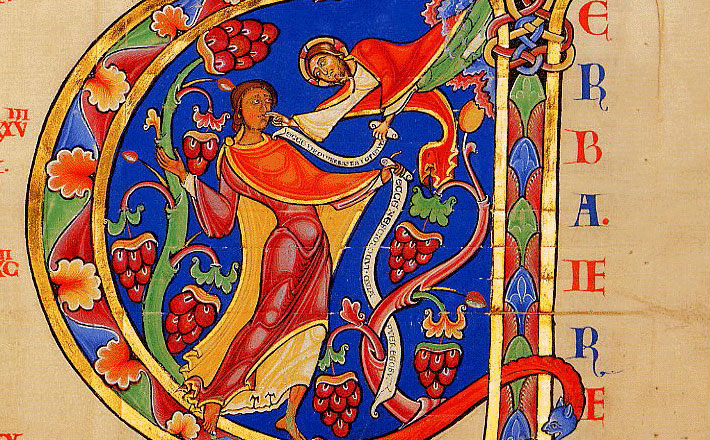Commentary on Matthew 16:21-28
As Matthew’s narrative unfolds, the solid rock on which the church will stand malforms into a stumbling block that threatens to obstruct Jesus’ mission.
Just moments ago (in narrative time), as they walked in the region of Caesarea Philippi, Peter and the disciples pondered Jesus’ question: “Who do you say that I am?” Not limiting himself to the options offered by “others,” Peter proclaimed his answer: Jesus is the Messiah, the son of the living God.
Peter got it right. But in the next instant, Peter gets it wrong. Wrong enough, Jesus suggests, for him to be in league with Satan.
Temptations to glory
Security. Influence. Power. It is hard to resist their glorious lure.
Perhaps that is Peter’s challenge. He cannot help thinking that his close association with the Messiah will right all that is wrong about the world.
But Jesus’ announcement of the death-dealing events about to unfold in Jerusalem point to anything but the glory of security, influence, or power. What about the new church, and its authority to bind and to loose? What about withstanding the power of death (“the gates of Hades”)? How can these things happen if God’s own anointed one is to be tortured and executed?!
No wonder Peter protests. “God forbid it, Lord! This must never happen to you!” Jesus’ response is swift and to the point: “Get behind me, Satan!”
Even in translation, the similarity to Jesus’ command to the devil in the wilderness is clear: “Away with you, Satan!” (Matthew 4:10). Could it be that Peter’s fervent wish, that God would prevent the horrors about to be visited upon Jesus, is something like the Tempter’s offerings in the wilderness?
Satan dared Jesus to use his authority as Son of God for his own purposes instead of serving God’s mission in the world. He tempted Jesus to set his mind on human things rather than on the things of God (see also Jesus’ words to Peter, Matthew 16:23).
Jesus refused. Instead of hoarding bread made from stones to relieve his own empty stomach, he fed the hungry multitudes (Matthew 14:17-21; 15:33-38). Instead of claiming the privileges of Sonship to call on God’s angels for his own benefit, he used his privilege to save, heal, and restore the lives of sick and marginalized persons. Instead of grasping after worldly varieties of power and authority, he opened the kingdom of the heavens to all who would follow after him in the way of righteousness.
Jesus refused to fall into the Tempter’s trap and be diverted from God’s mission. He showed the falsehood of the world’s measures of authority. Along the way, he revealed what it looks like to serve in the ways of God.
At Caesarea Philippi, Jesus’ response to Peter echoes his wilderness repudiation of the devil. He refuses to avoid the journey that lies ahead, despite the fact that pointless suffering, caused by human sin and violence toward an innocent one, will appear to win (as he outlines in this first of three passion predictions).
It is necessary (Greek: dei) for him to go to Jerusalem. Why? Because, “on the third day he will be raised” (Matthew 16:21). God will put the lie to violence as ultimate power.
Getting behind the Messiah
Worth noting is a distinction between Jesus’ commands to Satan and to Peter, one that is more obvious in Matthew’s Greek than in most English translations.
In Matthew 4:10, Jesus expels Satan from his presence: Go [away]! (hypage). But to Peter, Jesus adds words that remind him of his place as a disciple: Go behind me (hypage opiso mou, emphasis added).
In Matthew, the words opiso mou (“behind me” or “after me”) signify discipleship. The proper place for a disciple is behind Jesus, in the place of a follower. For example,
- Jesus’ call to Simon Peter and the others: “Follow me (literally: Come opiso mou), and I will make you fish for people” (Matthew 4:19).
- In a discourse about discipleship: “[W]hoever does not take up the cross and follow me (literally: Come opiso mou) is not worthy of me” (Matthew 10:38).
- In this week’s passage: “If any want to be my followers (to come opiso mou), let them deny themselves and take up their cross and follow me” (Matthew 16:24).
Peter is the recipient of blessing (Matthew 16:17), but now, he is putting his own thoughts ahead of the ways of God, which makes him a stumbling block—a hindrance to Jesus’ mission. Nevertheless (and this is significant), Jesus does not break relationship with him. Instead, he reminds Peter of the proper place for a follower.
Not the first time, nor the last
This is not the first time Peter falters, nor will it be the last. To be sure, Peter is the first to follow Jesus when called (Matthew 4:18-19) and he gets top billing whenever disciples’ names are listed in Matthew (for example, Matthew 10:2; 17:1; 26:37). He is an eager student,[1] unafraid to ask for an interpretation after Jesus tells yet another enigmatic parable (Matthew 15:15). Nonetheless, Jesus calls him out for his “little faith” when fear gets the best of him as he steps out of a boat into stormy waters. Peter-the-Rock sinks like a stone (Matthew 14:28-33).
Later, Peter bravely vows to stick with Jesus no matter what happens, boasting that even the threat of death could never cause him to deny his Lord (Matthew 26:33, 35). He fails miserably in fulfilling both promises, staying far away when Jesus is arrested (26:58) and denying him repeatedly while Jesus faces trial and torture. He is nowhere to be found at the crucifixion, while the power of government-sanctioned violence is inflicted upon the Messiah.
The soaring height of Peter’s commitment is matched by the depth of his failure to follow.
Promises and outcomes
Nevertheless, the promise that frames Matthew’s Gospel still stands. The One who is called “God with us” (Matthew 1:23), promising to be “with you always, even to the end of the age” (Matthew 28:20), is already and always going ahead of his followers—the first one to face the worst that the world can do. This is what makes it possible for those who want “to go after me” (NRSV “to become my followers”) to take up their own cross and follow (Matthew 16:24).
Jesus puts his life on the line ahead of all who follow him. Whether to the forsaken places of the wilderness or the centers of human might and authority, Jesus is there.
What does it look like to trust God in this context? How might the Messiah’s presence enable today’s disciples to follow “behind Jesus,” even when the prospects are frightening or the personal costs are high? What might they do for the sake of the world if they trusted in the promise of the One who goes ahead of them?
Notes
Worth noting, perhaps, is that the Greek word for disciple (mathetes) means “student” or “learner.”


August 30, 2020